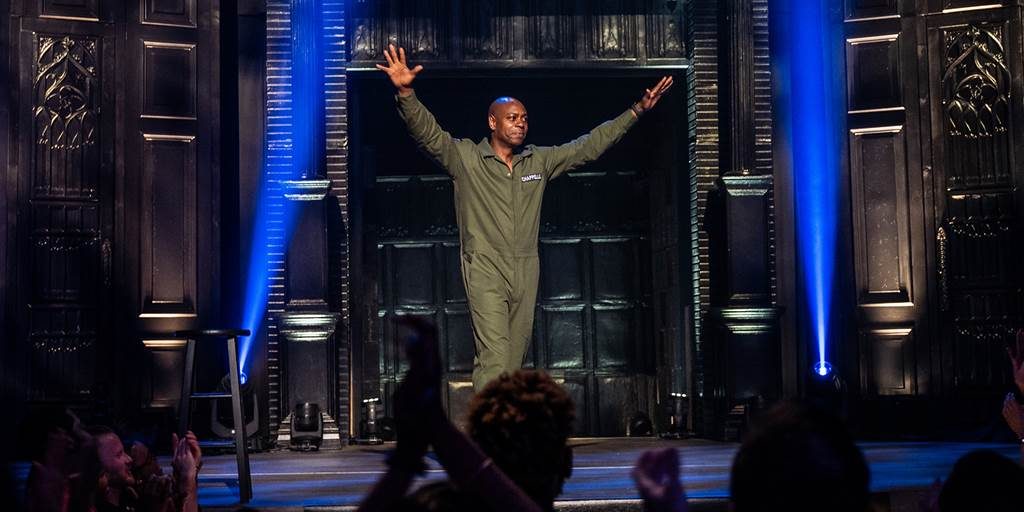By what standards do we distinguish real growth from regression, real freedom from veiled enslavement?
Dave Chappelle and the Woke Conscience
Dave Chappelle’s hilarious new Netflix special, Sticks & Stones, confirms him as this generation’s most famous and daring comic in America. He’s also therefore the most strangely positioned—a black liberal who has dedicated his career to mocking the piety of the wealthy white liberals who consider themselves arbiters of taste in popular culture.
This is the most important and obvious fact about Chappelle. He’s what Americans pride ourselves on, a rugged individualist, a man who doesn’t take his opinions either from mobs or elites. Why aren’t there more like him? Why don’t we call for more like him? Perhaps it’s because he’s too independent, famously willing to walk away from $50 million because he didn’t want his studio and audience to rule him. He’s what hardly any celebrity wants to be, since celebrity depends on flattering audiences, which requires conformism, following fashions—treating the latest moral prejudices as the eternal truths of revealed religion.
Of course, his business is comedy, not a morally enlightened debate, so expect vast, unquenchable resources of vulgarity in his work. But do not be deceived therefore that vulgarity is mindless or simply deleterious. Vulgarity is unavoidable in our pop culture, but Chappelle’s includes a strong moral-political argument, that vulgarity is truly closer to our nature than moral preening. His example suggests that people who try to make careers by stoking popular indignation are not as serious as the people who laugh at such pretensions.
Chappelle is not just talented or crafty—he is also an intelligent observer of America. As such, we have much to learn from him, even though he is a liberal primarily addressing liberals. And what else could he do? He only sees other Americans at a distance that precludes the conversation implicit in comedy. We live ever more politically segregated lives and political controversy takes over more and more topics, so it’s hard to give each other a hearing. Comedy now is one of the rare chances we have to learn about each other.
This, of course, only applies to comics who, like Chappelle, are liberal critics of liberalism—they’re not conservatives nor even friendly to conservatism, but they can help conservatives see the good and bad in liberalism. He addresses himself, unasked, to the opinions that have become dominant in public discourse. His purpose is to correct the excesses of an increasingly hysterical liberalism and in this he seems to me much more competent and serious than most intellectuals. He talks about abortion, LGBT, and race hoaxes in ways meant to make liberals laugh, but primarily at themselves, which is now very rare.
He points out that arguing for abortion rights on the ground of individualism would lead to a dissolution of every woman’s claims on the property of any man: To “my body, my choice” answers “my money, my choice.” But he goes beyond that to suggest the cruelty of such debates, with a terrible phrase only comics would dare utter in public: If you ladies can kill the child, the least I can do is abandon him. His audience, needless to say, is less than enthusiastic at this point, and he says: And if I’m wrong on this, maybe we’re wrong on this. . .
Then, he deals with the most fanatically held opinion among liberals just now, which deals with sexual identity. The body includes a fundamental tension between what is natural and what is chosen, both tied up in strange ways with chance. Liberal piety about individualism and identity here reaches its crisis, since it extols both the spontaneously occurring—“born that way”—and the artificially chosen—surgery. Desire turns out to be complicated and often turns one against oneself.
Chappelle claims he has a right to laugh about these things, because no amount of moralism can hide the absurdity of the possibility of being born in the wrong body, a necessary implication of the liberal belief in self-determination. This should lead not to activism, but reflection on man’s cosmic predicament—how can it be that our only experience of being human can be so self-contradictory? But that would not help the ideology of individual liberation, so it’s not part of our public discourse. More, his comedy points out that liberalism, once dogmatically in favor of nature as a standard for judging human equality, now dogmatically imposes dubious, rapidly-changing conventions, enforced by hysteria.
Instead of honoring these conventions, Chappelle looks behind them to conflicts between the various parts of what he calls the “alphabet people”—the LGBT coalition—where he detects any number of prejudices impolite to mention. Prejudices are delightful because they are impolite or even immoral—they give us insight into how other people think. This by itself further reminds us that prejudices are part of what spontaneously occurs in our lives and in our minds, the mark of individuality in every case where liberals don’t get hysterical.
His point here and throughout his attack on wokeness seems to be, hysteria is now the dominant mood of moral discourse precisely because liberals sense they are caught in a contradiction on the question of individuality. Can people be trusted to spontaneously conform to Progressive moral imperatives, especially when these change? Or must they be brow-beaten into compliance? Progress seems to now find it necessary to prefer the artificial or conventional to the spontaneous or natural. More, since previous, hippie notions of liberation were wedded to spontaneity and they failed to make us happy, now liberation is supposed to come by ruthlessly enforced conventions. These may also fail to make us happy, but they’d give us the satisfaction of punishing people. Wokeness may be irrational, but certainly delivers harsh, swift justice.
This finally brings us to the most ridiculous example Chappelle gives, one ripped from recent headlines, the race hoax spread by actor Jussie Smollett with great support in the media and among liberal elites more broadly. Indeed, with legal impunity, it seems. Chappelle says, black people were mostly silent about this, as a sign of support—they knew it was a lie. His joke is: just think of this guy as French, pronounce his name differently, get some distance from the matter—can you still in all honesty pretend this ever made sense?
This is the problem with Progress by the path of artificiality—conmen abound and some can now boast the moral sanction of whatever public authorities our culture has left. It’s not an accident that the more censorious and narrow-minded online mobs get—the more driven by self-righteous indignation—the more gullible we’re all supposed to be, and deferential. Noble-sounding ideals of justice and equality become travesties and we’re all supposed to swallow it.
The Smollett case seems like a mere accident of the news cycle. But it brings out an essential problem for comedy. If artificial conventions can be imposed on public opinion, how then will a comedian be allowed to make fun of the crazy things we say and do without noticing it? If this becomes unthinkable, how could comedy move us back to a more natural, reasonable attitude? Comedy is art, but it opposes the artificiality of moralism, precisely because comedy proceeds as though by chance, from neglected or disregarded details to fundamental problems. We are neither as wise nor as powerful nor as pure as Progress assumes—but nor are we as blind to the unexpected or insightful aspects of our existence as it requires us to be. Comedy shows we could always notice something publicly neglected which turns out to reveal something of great importance.
The element of surprise in comedy—consider how few jokes are funny the second or tenth time you hear them, unlike favorite songs you’ll listen to all your life—ultimately depends on things we don’t notice because we’d be ashamed if we did. The comedian needs tolerance, the willingness of people to listen, even if he buys it at the price of being laughed at, held in contempt, and disregarded as a thinker or political teacher.
That we’re surprised at ourselves, when the comedian raises a mirror to us by aping us, shows something like innocence—for once, we’re not protesting our innocence, respectability, and authority, or the right not to be made fools of. This is the key to the show, which accordingly opens with open mockery of woke internet mobs who are then identified with the Netflix audience. So we should listen to the last man in America allowed to say such things.



